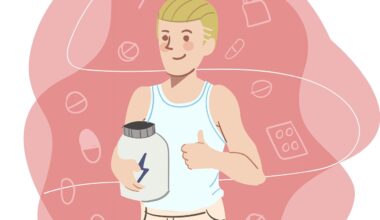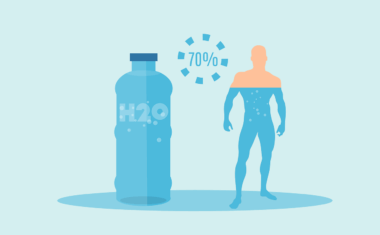The Science Behind Electrolyte Absorption and Utilization
Electrolytes play a crucial role in maintaining bodily functions. They are minerals found in various foods that dissolve in the body’s fluids, becoming charged ions. Some common electrolytes include sodium, potassium, calcium, magnesium, and chloride. Each electrolyte has distinct roles, such as regulating fluid balance, muscle contractions, and nerve signaling. When we sweat or engage in high-intensity activities, we lose electrolytes, which can lead to imbalances, resulting in fatigue and decreased performance. Therefore, understanding how electrolytes function and are absorbed in the body is essential for optimal hydration strategies. The gastrointestinal tract is responsible for absorbing these electrolytes. Once ingested, the small intestine breaks down the electrolytes, allowing them to enter the bloodstream. After absorption, these minerals are distributed throughout the body where they perform their functions. Foods rich in electrolytes, such as bananas, spinach, and dairy, should be included in a balanced diet for effective hydration. To enhance electrolyte absorption, it’s important to consume them with water or in fluids such as sports drinks. These drinks often contain added sugars, which can influence absorption rates and overall hydration.
Understanding Electrolyte Imbalance
Electrolyte imbalance can cause a range of health issues if not addressed promptly. Common symptoms of imbalance include muscle cramps, fatigue, irregular heart rhythms, and confusion. Factors contributing to these imbalances include excessive sweating, dehydration, chronic illness, and an unbalanced diet. Each of these factors has unique implications for performance and health, which is why monitoring electrolyte levels is critical. For example, during intense workouts, the body loses significant amounts of sodium and potassium through sweat. Consequently, replenishing these electrolytes can improve performance and prevent dehydration. Athletes often need specialized hydration strategies to replace the electrolytes lost during activity. This can include tailored sports drinks that contain an appropriate mix of sodium, potassium, and carbohydrates. Furthermore, understanding how the body utilizes these electrolytes can provide insights into improving recovery times post-exercise. By ensuring that the body’s electrolyte levels are balanced before, during, and after physical activity, athletes can maintain peak performance while minimizing health risks associated with electrolyte disturbances. Regular monitoring through blood tests can be beneficial to ensure that athletes remain within a healthy range.
Additionally, dietary sources of electrolytes provide a straightforward way to replenish depleted levels. Foods like avocados, nuts, and seeds are excellent sources of magnesium, which is essential for energy production and muscle function. Leafy greens offer a rich source of calcium, vital for bone health and muscle contraction. Bananas are famously known for their potassium content, which plays a crucial role in heart function and muscle contractions. A diet rich in these foods can help maintain electrolyte balance, especially during rigorous training. Keeping meals varied ensures that all electrolyte needs are met while providing essential vitamins, minerals, and hydration. However, relying solely on diet may not always suffice, especially in high-performance sports. So, consuming sports drinks specifically designed for replenishing electrolytes is advisable. These drinks can quickly restore electrolytes while also hydrating the body efficiently during exercise. Proper timing of electrolyte intake is also vital; consuming them before and after workouts can aid in optimal performance. Educating oneself about the role and absorption of these electrolytes creates a pathway to better hydration strategies during physical activities.
The Role of Hydration in Electrolyte Absorption
Hydration plays a pivotal role in absorbing and utilizing electrolytes effectively. Water serves as a solvent that facilitates the transportation of electrolytes to cells and tissues, ensuring they reach their intended destinations efficiently. Without adequate hydration, the body struggles to absorb and balance these critical minerals, which can impair various bodily functions. The kidneys also regulate electrolyte levels by filtering blood and excreting excess minerals through urine. Thus, maintaining proper hydration is key to this process. When the body is dehydrated, kidney function may diminish, leading to an electrolyte buildup or deficiency. Consuming fluid during physical activity becomes essential not only for performance but also for recovery. This is where electrolyte drinks come into play, as they can contain the right mix of minerals and sufficient fluids to support hydration. Athletes should tailor their hydration strategies based on their activity levels, environment, and time spent exercising. Beyond physical activities, daily water intake should not be overlooked for overall electrolyte management. Keeping hydrated throughout the day can support better absorption and utilization of these vital minerals.
Moreover, the body’s individual needs for electrolytes vary based on age, activity level, and health status. Older adults may require closer monitoring of their electrolyte levels due to a reduced ability to retain water. This demographic is more susceptible to dehydration, which can lead to serious health complications. Likewise, individuals with certain medical conditions may require specific adjustments in their dietary intake of electrolytes. Athletes, on the other hand, may need to increase their electrolyte consumption significantly, especially during competitions or intense training periods. Understanding these variations ensures that each individual’s hydration strategy is personalized for optimal health and performance. Therefore, services like personalized nutrition counseling may help tailor diets and hydration strategies to meet individual needs. Additionally, educational resources about electrolyte needs for different lifestyles can empower individuals to make informed decisions. Utilizing technology, such as hydration tracking apps, can also assist users in maintaining appropriate fluid intake levels. Overall, paying attention to personal needs fosters a healthier approach to hydration and electrolyte management.
Electrolytes in Sports Performance
Understanding the dynamics of electrolytes in sports performance can significantly improve athletes’ training outcomes. Optimal hydration and electrolyte supplementation strategies ensure athletes maintain stamina and minimize any adverse effects from dehydration. During prolonged physical activity, electrolyte loss can lead to fatigue and reduced cognitive function, impacting overall performance. For instance, athletes losing more than 2% of their body weight through sweat can experience performance decrements. This situation highlights the importance of pre-, mid-, and post-exercise hydration strategies rich in electrolytes. Studies indicate that consuming drinks containing electrolytes significantly assists in maintaining endurance during prolonged exercises. These findings are supported by research emphasizing that electrolyte solution significantly enhances pace and reduces the incidence of muscle cramps. This evidence portrays electrolyte drinks not merely as a choice but as essential components for athletic success. Furthermore, electrolytes can affect mental focus; thus, a precise mix can prevent physical fatigue while supporting cognitive responses during demanding activities. Hence, athletes ought to experiment with various formulations during training sessions to find how best they can optimize their hydration strategies for competitive situations.
Lastly, the importance of staying informed about the latest research in hydration and electrolyte strategies cannot be overstated. Advances in sports science provide athletes and coaches with new insights into effective hydration practices. Staying updated allows for better understanding and implementation of innovative hydration protocols that cater to individual needs. For example, research developments uncover the critical interaction between hydration status and performance metrics, such as speed and endurance. Furthermore, analyzing how different electrolyte combinations impact hydration and performance outcomes can revolutionize traditional approaches. Coaches can incorporate these findings into training plans, offering tailored hydration guidance based on each athlete’s specific physiology and sport. It’s also essential to note that hydration science evolves; thus, staying informed through credible sources such as sports science journals, webinars, and workshops is beneficial. Athletes who incorporate the latest hydration strategies can enhance their competitive edge. Taking an exploratory approach when considering new information ensures that one’s hydration strategies align with current science. Ultimately, being proactive in organizing hydration strategies ensures safer, more effective performances in sports.
Conclusion
In conclusion, understanding electrolyte absorption and utilization is fundamental for effective hydration. Whether for athletic performance or everyday health, maintaining electrolyte balance will contribute to overall wellness. Consuming a well-rounded diet full of electrolytes, and hydrating properly before, during, and after exercise, optimizes bodily functions. Furthermore, personalized approaches to hydration strategies will ensure that individual needs are met, fostering better health outcomes. Awareness of signs of electrolyte imbalance and ensuring adequate recovery plays a crucial role in maintaining hydration levels. Athletes and active individuals must stay informed and adaptable in their hydration practices, incorporating new research findings. Investing time in education around hydration not only improves athletic performance but enhances general health. The connection between electrolytes and hydration underscores the significance of these minerals in our daily lives. Hydration is not just about drinking water; it’s about creating balance within the body’s chemistry. Making informed choices can lead to improved physical and mental performance. Building effective hydration strategies can also mitigate health risks associated with dehydration. Therefore, prioritize electrolyte management for both physical activity and general well-being.





